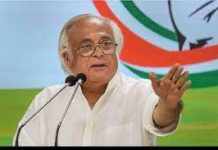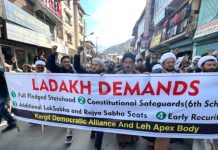
“April is the cruellest month,” penned TS Eliot in The Waste Land, rated as one of the most important poems of the 20th century. However, for Congress it is May which brings the blues. Two years ago this very month, it received a historic drubbing in the 16th Lok Sabha elections. Now Congress is at a historic all-time low.
To quote from poet-dramatist William Shakespeare’s Hamlet, “When sorrows come, they come not single spies. But in battalions!” This again applies to Congress and its leaders like Sonia Gandhi and Rahul Gandhi in view of forthcoming elections in Uttar Pradesh and Punjab. The Congress, it seems, has become a party of part-timers from select, comfortably placed families who refuse to go out in the village and listen to people. It lost going solo (Assam) and also lost with alliances (West Bengal, Tamil Nadu, Kerala). As for CPM, it was like sleeping with the enemy.
Political immortality
The recent Assembly election results send a clear messages that Mamata Banerjee ‘Didi’ has achieved a political immortality of sorts, J Jayalalithaa ‘Amma’ has ended Tamil Nadu’s yo-yo trend. Prime Minister Narendra Modi and BJP party president Amit Shah, after losses in Delhi and Bihar, have silenced their critics. The only consolation for Congress has been a win with alliance partners in Puducherry.
It wouldn’t be wrong to say that Jayalalithaa has created history by returning to power for a second consecutive term in a state where such a feat has not been achieved in nearly three decades. The state has routinely seen Jayalalithaa’s AIADMK and its principal opponent, the M Karunanidhi-led DMK, alternating as the ruling and opposition parties.
For the DMK, the drubbing in the Tamil Nadu Assembly election could prove costly as the party, which is held together by the 92-year-old chief M Karunanidhi, could split in the backdrop of infighting between his three siblings though the Congress-DMK alliance has secured a simple majority of 17 seats in the 30-member state assembly. For Tarun Gogoi, however, anti-incumbency was too strong and he proved unlucky for a fourth term as Chief Minister. Traditionally too, Kerala has kept the tradition of voting out a ruling party.
The only morale booster for the Left has been the win in Kerala, where the Left Democratic Front (LDF), a coalition of Left-wing parties led by the CPM won a decisive mandate, unseating the Congress-led United Democratic Front (UDF). The results of Assembly election in Kerala have proved to be a watershed in state politics because the LDF has been able to vanquish its traditional rival, the UDF very convincingly.
‘Didi’ emerges strongest satrap
It is Mamata Banerjee who has clearly emerged as the strongest regional politician in the country. In a field that includes J Jayalalithaa, Mulayam Singh Yadav and even Nitish Kumar, ‘Didi’ is miles ahead because of the scale of her victory in West Bengal, combined with the fact that she doesn’t need anyone’s support. All others need her for their political ambitionrtts. Her pro-poor persona, personal integrity and welfare programmes like ‘Khadya Saathi’, ‘Konyashree’ and ‘Sabuj Saathi’ have won her popular support, catapulting her political fortunes. The Trinamool Congress (TMC) fought the election on her own, knowing well the political pulse of the state. Result: they recorded the biggest electoral victory in four decades.
With a substantial gain in vote share in the recent election, ‘Didi’ has established once for all her unassailable strength and invincibility in regional politics. Though it is already clear that she has moved away from the Congress, the BJP cannot take her support on everything for granted. In most cases, she will lean towards the BJP, simply to keep the party at the Centre happy, but she will demand more than her pound of flesh each time. She will also ensure that the BJP does not grow too big in West Bengal.
Might of regional players
Another clear message from the election results is that the regional parties continue to be strong. Neither the BJP nor the Congress, despite having run governments at the Centre, have the following that the regional parties have in their respective states. In crucial states like Uttar Pradesh, West Bengal, Andhra Pradesh, Telengana, Tamil Nadu and Bihar, the national parties do not enjoy the kind of support the regional parties have. In Uttar Pradesh and Punjab that go to polls next, it is again regional parties that have a major sway among voters. If Uttar Pradesh has parties like Samajwadi Party of Mulayam Singh Yadav and Akhilesh Yadav, Bahujan Samaj Party of Mayawati, in Punjab, the Shiromani Akali Dal led by Parkash Singh Badal and Sukhbir Singh Badal matters the most.
Is corruption an elite concern?
Apparently, the voter’s behaviour defied logic, as price rise was nowhere on the agenda and corruption seemed to be an elite concern. The issue that mattered most was development and launch of popular schemes by different parties. More than the issue of corruption or price rise, personalities mattered prominently in polls. The BJP grabbed Assam by presenting Union Sports Minister and former Asom Gana Parishad (AGP) leader Sarbananda Sonowal as the chief ministerial face. In West Bengal, the election revolved around one personality: that of Mamata. With no matching leader of stature and mass appeal, Congress and CPM suffered and were shown the door by the electorate. Dubbed a party of oldies, the CPM and its ideology don’t seem to enthuse young Bengalis. This led even Mamata Banerjee to make the famous comment that the alliance between Congress and CPM was a historic blunder. In Tamil Nadu, Karunanidhi’s age mattered as also his son Stalin’s unreliability.
No room for sham coalitions
The electorate now likes to give full majorities. After the BJP’s victory in May 2014 where it got a clear mandate, in all elections barring two, voters have given a decisive mandate. Delhi voted the Aam Aadmi Party but Bihar embraced the Grand Alliance. In all the five states this time, the verdict has been clear, with no room for horse-trading as was witnessed recently in Uttar khand. Obviously, the message from the voter was: ‘Don’t worry, we will give you a clear majority. In return, we want clean governance and implementation of pre-poll promises and development of the state. You slacken or forget the developmental agenda and we will look for alternatives.’
Voters can see through sham coalitions. The Congress and the Left were partners in West Bengal and opponents in Kerala. The Left has been anti-Congress for decades and their new found love in West Bengal didn’t sound right. Adjustments can be made, but full-fledged electoral partnerships among long-standing rivals will not work.
BJP has pan-India presence
The BJP now has a pan-India presence. The coalition government in Karanataka in 2005 was its first foray in the south and now it has established a government in Assam in the North-east. It has also opened its account in Kerala and has shown it can make forays into West Bengal. All this should be of a great help when it comes to 2019 general elections. By replacing the Congress’s 15-year rule with a decisive mandate in Assam, the BJP has vaulted to power in the state for the first time. With this, it will get to play a decisive role in the politics of the tumultuous North-eastern region, where it was only a marginal political force till recently.
The win will enthuse the cadres, who were demoralised after Delhi and Bihar rejected the party. The BJP’s rise in new regions, along with the steady weakening of the Congress, will have strong ramifications and impact national politics. On the other hand, the popularity of Modi remains high and the series of measures his government has taken for public welfare are beginning to bear fruit. The people have obviously liked the performance of Modi government during the two years.
Congress’ existential crisis
The Congress is now in the throes of an existentialist crisis. It retains a small support base, but that will keep eroding as more and more voters turn to other alternatives, because the Congress has little now to offer. Fingers can be pointed at the Gandhi family. Already, party MP Shashi Tharoor has aired the view that the Congress needs young faces at all levels for its rejuvenation.
The trends evident from the election are that Congress now is a vanquished house and the party’s pitiable state can be gauged from the fact that its leaders rushed to congratulate vice-president Rahul Gandhi when it won five wards in Delhi’s municipal by-elections.
The marginalisation of the Congress in the Assembly elections has put the focus back on the party leadership. The party rank and file is sure to question president Sonia Gandhi and vice-president Rahul Gandhi for the humiliating defeats coming one after the other. The fact is just two years after its historic defeat in the 2014 general election, Congress governments have been ousted from six states. Of these, five went to the BJP and its allies, signalling a clear shift in voter preferences.
Questions to ponder
Does the Congress need new faces at all levels to reinvent itself? Is it the end of dynastic Gandhi family rule in India? Will ‘Didi’ eye Delhi in the near future in view of her margin of victory, like Modi who graduated from CM to PM? Will BJP magic slogan of ‘Sabka saath, sabka vikaas’ be as successful in rest of India as in Assam? These are some of the questions political players would need to ponder over in future.
[box]
“The polls have made it clear that the BJP’s ideology is being accepted, appreciated and supported by more and more people in the country. It is great for democracy.”
— Narendra Modi
“The country has taken two more steps towards a Congress-mukt Bharat. This time a solid foundation has been laid for a building by 2019.”
— Amit Shah
“No failure is permanent if one sticks to principles. Success achieved by discarding basic principles will not last long. And if the basic principles are intact, then no failure is permanent.”
— Sonia Gandhi
“We accept the verdict of people with humility. We will work harder till we win the confidence and trust of people.”
— Rahul Gandhi said on Twitter
“The opposition had spun a web of lies and conspired against TMC which is not good for politics and public life. The coming together of CPI(M) and Congress Party proved to be a historic blunder for both the parties”
— Mamata Banerjee
“There are no words in the dictionary to describe my gratitude to the people of the state. I have no other interest in life except to work for the people of Tamil Nadu.”
— J Jayalalithaa
[/box]
letters@tehelka.com








